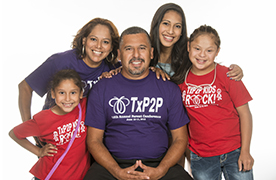Jump to topics on this page:
 Military families face unique challenges. A change of duty station might mean a move to a new city, state or country, and a deployment may mean that one parent is leaving for a long time while the rest of the family stays behind.
Military families face unique challenges. A change of duty station might mean a move to a new city, state or country, and a deployment may mean that one parent is leaving for a long time while the rest of the family stays behind.
Military families we’ve spoken to have said these transitions are often harder for those with children or adult children with disabilities or special health care needs. By using available services and tools, doing your own research, and getting organized for each transition, you can make sure your child gets the services they need.
Below are programs, resources and tips to help you.
The Exceptional Family Member Program (EFMP) is designed to help children in military families who have unique medical or educational needs. Read a summary and find more details on the program on Military OneSource.
Members of the military who are active-duty or active guard reserve must sign up for the Exceptional Family Member Program if they have a child with a disability or special health care needs. Military OneSource has a custom EFMP & Me tool with checklists, resources and referrals to help you find support.
The U.S. Coast Guard is not part of the this program, but members can register in the Coast Guard Special Needs Program by calling work-life staff at their nearest Integrated Support Command.
The Exceptional Family Member Program offers these three important services:
TRICARE is the health insurance program for all military families. Some children in military families may be able to get the TRICARE Extended Health Care Option (ECHO). ECHO gives financial help to families of children who have disabilities or special health care needs for care not typically covered under TRICARE.
Some of the services that ECHO might cover include:
To sign up your child for ECHO, talk to your regional TRICARE representative and your local Exceptional Family Member Program caseworker. Learn more by reading the ECHO fact sheet.
Children with autism spectrum disorders might also be able to get applied behavioral analysis services through the TRICARE Autism Care Demonstration.
Getting a new assignment can be challenging. Read tips from other parents on what to do before relocating to your new base and find a list of important things to do before you leave.
There are many programs for military families of children with disabilities or special health care needs, and other parents who can help. Here are a few ideas: